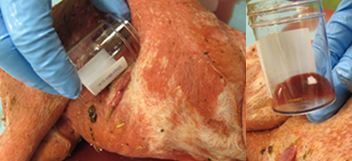Schmallenberg Update
With the peak of the spring calving and lambing season approaching, we wanted to give a further update on Schmallenberg virus:
- In January and February 2021 our Disease Surveillance Centres saw no confirmed cases of congenital deformity in calves or lambs due to in-utero Schmallenberg virus (SBV) infection in Scotland
- Screening of 141 maternal blood samples for SBV antibody as requested by vets through passive surveillance has identified a very low level of seropositivity in Scotland so far
- Feedback from surveillance colleagues in Germany suggests that they did not confirm any cases of acute SBV associated disease in cattle last summer. They have seen a small number of SBV malformations in lambs so far this year
- Feedback from surveillance colleagues at APHA suggests that they too have seen some SBV malformations in lambs as well this year
Although, of course there is nothing that can be done now if SBV cases are seen, understanding where and when cases occur this year might help inform future control if needed.
Our suggested investigation protocol is as follows:
- Firstly, as the congenital deformities frequently lead to dystocia, practitioners are very likely to see suspect cases, especially in high value pedigree sheep flocks
- If you are able to submit still born calves and lambs, we will include SBV testing (PCR, foetal serology and histopathology) as appropriate as part of the standard investigation work up at no extra cost
- If you are unable to submit the whole carcass, please collect a piece of umbilicus and an amniotic fluid sample as outlined below. Please give your local disease surveillance hub a call to discuss the case and we will carry out specific testing for SBV free of charge
- A photograph of the affected lamb or calf messaged to us as well would be very useful
- Maternal serology is potentially useful in addition to sampling the calf. Our expectation is that SBV seroprevalence in the Scottish sheep and cattle populations is low. Please bear in mind that there is reasonable evidence that SBV antibody can persist for 6 years in cattle and 4 in sheep, so positive serology is not necessarily indicative of recent infection

Collecting amniotic fluid from a foetus.
SRUC Veterinary Services reviewed 31 cases of congenital deformity in calves and lambs received in 2017 as suspect SBV cases. The findings were interesting:
- 8 cases were confirmed as being caused by in utero SBV infection
- 15 cases showed arthrogryposis or CNS pathology like SBV cases but the cause was consistent with either a genetic defect or exposure to a teratogen in utero and not SBV
- 8 cases showed pathology that was not consistent with SBV exposure
The full article can be read at: https://veterinaryrecord.bmj.com/content/181/13/341.2
Posted by SRUC Veterinary Services on 09/03/2021
Categories:
